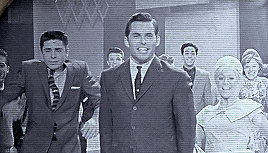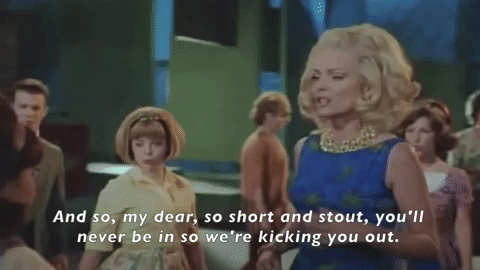Welcome to Hairspray, where a well-intentioned, woke, white teenage girl singlehandedly ends segregation in 1960s Baltimore.

Y’know, after watching Cry-Baby, I wasn’t super keen on revisiting Hairspray, but I figured it deserved a fair shot. I hadn’t seen the original since I was in high school, so I booted up HBO Max and settled in for a long night of old-timey dance moves and racial inequality. Guys… the 1988 version of Hairspray is flippin’ great.
The cast is just to die for. Ricki Lake, who I only knew as a talk show host in my childhood, is a great Tracy Turnblad. My favorite devious sea witch Divine is her mother, and Jerry Stiller is her father. Goddamn Debbie Harry and Sunny Bono are her rival’s parents, and Amber Von Tussle is motherfucking Colleen Fitzpatrick. As someone who has a vested interest in all famous Colleens, I was stoked to see that Hairspray was Vitamin C’s first acting gig.

FUN FACT: According to Wikipedia (which is never wrong), Graduation (Friends Forever) charts on iTunes at the end of every school year. Colleen is also the VP of music at Nickelodeon, so she’s doing just fine.
Anyway, the original Hairspray is campy, edgy and hilarious. If I were Miss Soft Crab 1945, I too would bring it up every chance I got. The story really boils down to two horny teenage girls trying to claw their way to the top, but the charm of Tracy is she’s trying to pull everyone else up with her. The way they handle segregation and racial inequality is over-the-top ridiculous, but somehow more realistic than its updated counterpart (put a pin in this). I mean, a racist white woman shoved a bomb in her hair to own the libs and it gloriously explodes on her head. I haven’t seen the musical adaptation of Hairspray, so my opinions of how true it is to its source material won’t be explored here, but the 2007 movie adaptation, to me, left a lot to be desired.
Hairspray might be the most popular in a recent trend of non-musical movies being adapted for Broadway. I remember back in the 90s when Beauty and the Beast hit the stage – it was so successful Disney now has the movie-to-Broadway pipeline on speed dial. But now we’re getting a shitload of movies with no musical elements being fast tracked to Broadway, like Kinky Boots, Bend it Like Beckham, Mean Girls, Beetlejuice, Heathers, Waitress, Legally Blonde, fucking Groundhog Day AND Matilda with music written by Tim Minchin, just, so goddamn many of them. I love musicals, but to say I didn’t want to see The Heathers threaten Veronica in 3-part harmony would be an understatement, so I’m immediately skeptical to the quality of this content and hesitant to consume it. Unfortunately for me, Hairspray is one of the few who had their *corny* musical adaptation also committed to film, and it is a neutered, earnest, high school choir translation of the original and it made my teeth hurt.
The two positives I’ll give the remake are the sets/costumes are great, and the cast serve their roles well, although I will never be OK with someone wearing a fat suit as a costume. The songs are… fine. Again, this era of music is not my favorite, so I’m never going to get excited over “It Takes Two” or “I Can Hear the Bells”. It’s just the tone is so different from the original, and by the end of the movie I was exhausted and very glad it was over. Writing about it now has required several breaks and side-tangents and I can’t even get to the fucking synopsis of the movie… ugh let’s just do this.
Tracy Turnblad is a “pleasantly plump” teenage girl living in 1960s Baltimore whose sunny disposition makes her oblivious to the reality of murky situation she is living in. We’re quickly introduced to her obsession, “The Corny Collins Show”, which features a number of far-out teens that love to dance, including multi-year winner of Miss Teenage Hairspray and miss Pitch Perfect herself Amber Von Tussel. Her mother, Velma, played by Michelle Pfeiffer, is the station manager at WYZT, and uses her power to keep Amber featured front and center.
After a girl on the show gets knocked up, an audition is held to replace her. While Tracy’s mother Edna, regrettably played by John Travolta in a fat suit, is afraid that Tracy’s weight will prevent her from landing the gig, her father, puzzlingly played by like a 60-something Christopher Walken, is generally supportive. True to Edna’s feeling, Tracy is fat shamed by Amber and Velma and doesn’t make the cut.

After getting detention for skipping class for an audition that didn’t pan out, Tracy makes friends with a bunch of black students who are all excellent dancers. Turns out her new friend Seaweed is the son of Motormouth Maybelle, the sometimes-host of “The Corny Collins Show”, played by Queen Latifah. Velma, in addition to being a massive bitch, also segregates the station’s black talent from the main show, only to be featured one night a month on “Negro Day”. While Tracy is boogying down, Link, Amber’s boyfriend and one of the stars of TCCS, peeps at her ass and tells her if she shook her rump in front of Corny at the Hop, he’d have no choice but to put her on the show.
In the original movie, Tracy Turnblad fucks. She moves in on Link and devours him whole, with no mind given to her size. She is a kind of bratty, confident young teenager that isn’t afraid to reach out and grab what she wants. Tracy in the 2007 version is the most innocent cinnamon roll that has ever been baked. Link gives her one compliment and she drifts into fantasies of marrying him. Part of me is annoyed by this, but the other part of me appreciates misguided optimism played as humor.
At the Corny Collins hop, Tracy steals borrows Seaweed’s dance move and lands a place on TCCS council. After declaring she wants every day to be Negro Day, the head of the station declares he wants that “chubby communist girl” off the show. Corny, played by a dreamy James Marsden, sticks his neck out for Tracy and furthermore, says the show should be integrated. As Tracy’s popularity skyrockets, the station shows more leeway to her size and her look, but to maintain some semblance of control, Velma works to completely edge out Negro Day.
Meanwhile, Link is clued into how fun it is in detention, and him, Tracy, and Penny all dance their way to Motormouth Maybelle’s record store for a potluck. When Seaweed introduces his new white friends to his mother, Penny delivers my favorite line of the whole movie, “I’m very pleased and scared to be here.” Amber rats out Tracy’s activities to her mother, and Edna arrives to Motormouth’s with the intention of dragging Tracy home until she realizes that black people are OK because they eat brisket.
After Edna shoves a bunch of food in her face, the gang finds out that Negro Day on “The Corny Collins Show” has been cancelled. Tracy has the great idea to protest the television station, and all the black people are like, “Why didn’t we think of that?” Link decides to bow out of the march because there’ll be talent agents at the Miss Hairspray Pageant, and he doesn’t want to give up his big shot at fame and glory to fight for a entire race of people’s basic rights.
The next day, Tracy and her mom are the only white people in a sea of black people to march to the station. Queen Latifah sings a very earnest song about the resilience of her community, because this is the Serious Portion™ of the musical. Tracy assaults a police officer without giving any mind to what it would do for all the black people she’s marching with, and runs away to let them handle the consequences. The movie doesn’t show any police brutality because Reasons, and a bunch of protestors are arrested and immediately bailed out by Tracy’s Dad. Tracy eventually ends up back at Motormouth Maybelle’s record shop so she can hide there without considering how dangerous it would be for Motormouth to harbor a fugitive of the law.
The next day is the Miss Teen Hairspray competition broadcast at WYZT, and with Tracy being wanted by the police, they have to sneak her into the station. She bum-rushes the set to sing a song with a now-enlightened Link about not stopping progress, while also inviting Motormouth Maybelle’s daughter, Little Inez, on stage to dance. Everybody calls-in to vote for her because the only racist people in Baltimore run the television station, and Little Inez is crowned Miss Teen Hairspray. Amber is like fine with it even though her mom isn’t, and everyone dances and sings to celebrate that “The Corny Collins Show” is now integrated! Meanwhile, I’m left wondering why Amanda Bynes was forced to wear a dress that she can’t move her legs in, even though they knew she would participate in the show’s closing dance number. The end.
Oh, and there’s also a whole B plot where Velma tries to fuck Tracy’s dad and Tracy’s mom finds out and gets upset for like 30 seconds. This is immediately resolved by a song and dance number among a bunch of laundry.
This movie is fine and competent or whatever, but for some reason it just rubs me the entirely wrong way. Tracy constantly says that the 1960s are changing for people who are different, implying that an overweight white teen also knows what it’s like to be discriminated against in the same way black people are. The movie does roll its eyes at some of her most tone-deaf “I’m an overenthusiastic ally” moments, like “I wish every day was Negro Day!” and “This is afro-tastic!”, but it also goes out of its way to talk about how much Tracy has helped the black community. Like, by doing what? Being fat and on TV? That being said, she does use her privilege to feature black dancers on a major television broadcast, so by the end of the movie she becomes the person everyone says she is. Also, I’m a dumb, overweight, white, middle-aged woman, so I’m not the right person to get all indignant about a well-intentioned feel-good Broadway musical.
Final thoughts: If you love bright colors, cheese, and sincere, glossy reflections of the 1960s civil rights movement written by a bunch of white dudes, this movie is for you.
